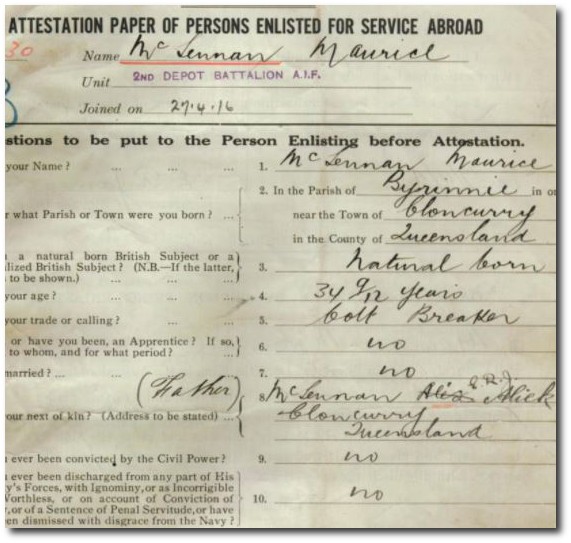
Extract from service record for Maurice McLennan, 5th Pioneer Battalion (National Archives of Australia)
Indigenous Australian, Maurice McLennan, 5th Pioneer Battalion
It's not clear why Maurice McLennan was in Port Augusta in April 1916, but two days after the first Anzac Day commemoration was held, he stepped forward to volunteer for the first AIF. Maurice was born near Cloncurry, Queenland to Alexander (Alick) Maurice McLennan and Katherine Burkitt, in 1882.
Prior to enlisting he had worked on several properties in the Cloncurry area, as a general station hand and horse breaker, his father Alexander was a miner of scheelite at Kajabbi, and sometime jockey. Maurice spent several months at the training camp at Mitcham, in South Australia, before being assigned to the 3rd Reinforcements for the 5th Pioneer Battalion and departed for England aboard the 'Seang Bee' in July 1916.
After several more months training Maurice embarked for France in November 1916, finally joining his unit in the field early January 1917. The Battalion was at that time deployed to Waterlot Farm on the Longueval - Guillemont Road, where the troops had been 46 days continually on front line work. They were set to clearing trenches in freezing temperatures - snow covered the ground, which was becoming too hard to dig, frozen hard, and all the time the enemy were firing shells at their position.
The Commanding Officer noted in the War diary for January 1917 the men "seem to be going to pieces after their work here" many were being sent to hospital, leaving the company short of troops.
Private McLennan was one of these men, evacuated to hospital with P.U.O. (Pyrexia - fever, unknown origin) - Trench Fever, although not serious this could be debilitating, recovery was often very slow. We now know that this fever was caused by a bacteria, and was spread by the lice which lived in the soldier's clothing. For Maurice McLennan it meant a long recuperation in England, before he was fit enough to return to his unit in December 1917. They spent that Christmas in billets at Hesdigneul-les-Boulogne, 'at rest' - training and resting the animals, which also endured the slippery and difficult weather conditions.
On the eve of the Battle of Amiens, 7 August 1918, the Battalion were given their orders, to clear the road running east-west through Villers-Bretonneux, making it passable for armoured traffic, by 4:00am the next day. That evening Maurice McLennan was found to be absent-without-leave, and was apprehended 9 days later, at Pernois, 30 km north of his post. Maurice was sentenced to 2 months F.P. no.2 (Field Punishment no.2) - and confined to camp until mid October 1918. For Maurice his active service was at an end; after the war ended the battalion was billeted in villages in France. First at Hautrepe and later Beaurieux, where the men were gradually demobilised, the last of them embarking mid for home mid 1919.
In January 1920 Maurice married Emma Johansson and having been granted an exemption from the Queensland Aboriginals Protection Act, he continued to live and work on properties in the Cloncurry region. He was injured in September 1920 while breaking in a horse at Gracemere, when the horse fell and rolled on him. In 1929 his mother Katherine wrote to Base Records from Kajabbi, requesting a 'Mothers Brooch" or a 'Nearest Female Relative Badge' which was subsequently dispatched and received.
When Maurice McLennan died in 1952 he was farewelled by family, friends and members of the Townsville RSL.
Read more ...
- Service record: McLENNAN, Maurice
- Embarkation roll: 3rd Reinf. 5th Pioneer Battalion
- AIF Unit Diaries: 5th Pioneer Battalion
- Condensed history of the 5th Pioneer Battalion by Herbert Gordon Carter
- 'Accident with horse' The Western Champion and General Advertiser for the Central-Western Districts, 18 September 1920 p.8
- 'Illegally killing a beast' Cloncurry Advocate, 7 November 1941, p.3
- 'Family notices' Townsville Daily Bulletin 26 April 1952, p.2
- One of the soldiers featured in SLQ’s HistoryPin Collection
- Queensland’s Indigenous Servicemen [oral history]
The information in this blog post has been researched by State Library staff and volunteers, it is based on available information at this time. If you have more information that you would like to share or further research uncovers new findings, this post will be updated.
Comments
Your email address will not be published.
We welcome relevant, respectful comments.